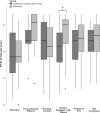Psychological well-being in elderly adults with extraordinary episodic memory
- PMID: 29059208
- PMCID: PMC5653294
- DOI: 10.1371/journal.pone.0186413
Psychological well-being in elderly adults with extraordinary episodic memory
Abstract
Objectives: The Northwestern University SuperAging Program studies a rare cohort of individuals over age 80 with episodic memory ability at least as good as middle-age adults to determine what factors contribute to their elite memory performance. As psychological well-being is positively correlated with cognitive performance in older adults, the present study examined whether aspects of psychological well-being distinguish cognitive SuperAgers from their cognitively average-for-age, same-age peers.
Method: Thirty-one SuperAgers and 19 cognitively average-for-age peers completed the Ryff 42-item Psychological Well-Being questionnaire, comprised of 6 subscales: Autonomy, Positive Relations with Others, Environmental Mastery, Personal Growth, Purpose in Life, and Self-Acceptance.
Results: The groups did not differ on demographic factors, including estimated premorbid intelligence. Consistent with inclusion criteria, SuperAgers had better episodic memory scores. Compared to cognitively average-for-age peers, SuperAgers endorsed greater levels of Positive Relations with Others. The groups did not differ on other PWB-42 subscales.
Discussion: While SuperAgers and their cognitively average-for-age peers reported similarly high levels of psychological well-being across multiple dimensions, SuperAgers endorsed greater levels of positive social relationships. This psychological feature could conceivably have a biological relationship to the greater thickness of the anterior cingulate gyrus and higher density of von Economo neurons previously reported in SuperAgers.
Conflict of interest statement
Figures

References
-
- Rogalski EJ, Gefen T, Shi J, Samimi M, Bigio E, Weintraub S, et al. Youthful memory capacity in old brains: anatomic and genetic clues from the Northwestern SuperAging Project. Journal of cognitive neuroscience. 2013;25(1):29–36. doi: 10.1162/jocn_a_00300 ; PubMed Central PMCID: PMC3541673. - DOI - PMC - PubMed
-
- Gefen T, Shaw E, Whitney K, Martersteck A, Stratton J, Rademaker A, et al. Longitudinal neuropsychological performance of cognitive SuperAgers. Journal of the American Geriatrics Society. 2014;62(8):1598–600. doi: 10.1111/jgs.12967 ; PubMed Central PMCID: PMCPMC4135532. - DOI - PMC - PubMed
-
- Harrison TM, Weintraub S, Mesulam MM, Rogalski E. Superior memory and higher cortical volumes in unusually successful cognitive aging. Journal of the International Neuropsychological Society: JINS. 2012;18(6):1081–5. doi: 10.1017/S1355617712000847 ; PubMed Central PMCID: PMC3547607. - DOI - PMC - PubMed
-
- Fotenos AF, Snyder AZ, Girton LE, Morris JC, Buckner RL. Normative estimates of cross-sectional and longitudinal brain volume decline in aging and AD. Neurology. 2005;64(6):1032–9. doi: 10.1212/01.WNL.0000154530.72969.11 . - DOI - PubMed
MeSH terms
Grants and funding
LinkOut - more resources
Full Text Sources
Other Literature Sources
Research Materials

